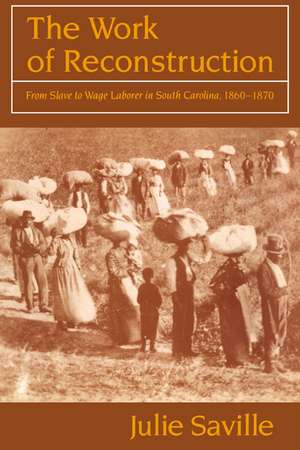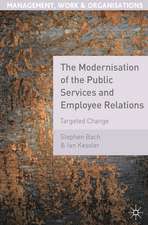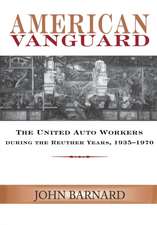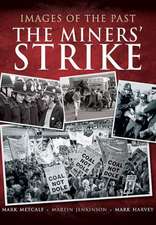The Work of Reconstruction: From Slave to Wage Laborer in South Carolina 1860–1870
Autor Julie Savilleen Limba Engleză Paperback – 25 apr 1996
| Toate formatele și edițiile | Preț | Express |
|---|---|---|
| Paperback (1) | 163.31 lei 3-5 săpt. | |
| Cambridge University Press – 25 apr 1996 | 163.31 lei 3-5 săpt. | |
| Hardback (1) | 718.54 lei 6-8 săpt. | |
| Cambridge University Press – 29 sep 1994 | 718.54 lei 6-8 săpt. |
Preț: 163.31 lei
Nou
Puncte Express: 245
Preț estimativ în valută:
31.26€ • 33.97$ • 26.27£
31.26€ • 33.97$ • 26.27£
Carte disponibilă
Livrare economică 31 martie-14 aprilie
Preluare comenzi: 021 569.72.76
Specificații
ISBN-13: 9780521566254
ISBN-10: 0521566258
Pagini: 240
Ilustrații: 4 b/w illus. 1 map
Dimensiuni: 151 x 227 x 16 mm
Greutate: 0.46 kg
Ediția:Revised
Editura: Cambridge University Press
Colecția Cambridge University Press
Locul publicării:New York, United States
ISBN-10: 0521566258
Pagini: 240
Ilustrații: 4 b/w illus. 1 map
Dimensiuni: 151 x 227 x 16 mm
Greutate: 0.46 kg
Ediția:Revised
Editura: Cambridge University Press
Colecția Cambridge University Press
Locul publicării:New York, United States
Cuprins
Acknowledgements; List of abbreviations used in notes; A note on spellings; Maps; Introduction; Part I. Freedom Versus Freedom: Competing Visions of Emancipation: 1. Antebellum field slaves' labor: regional overviews; 2. Twilight of slavery, dawn of freedom; 3. Rebels and 'rebels in disguise'; Part II. A Measure of Freedom: Plantation Workers and the Wartime Introduction of Wage Labor in Port Royal: 4. Eluding the confederacy's grasp; 5. Inducing wage labor behind federal lines; 6. Wartime planting; 7. 'A dollar a task'; 8. 'As hard times as they has see with the rebel'; Part III. Restoration and Reaction: The Struggle for Land in the Sherman Reserve; Part IV. The Reconstruction of Work: 9. Remaking family life and labor in the interior; 10. Control of the crop; 11. Control of supplemental plots; 12. Working on shares; 13. Holding onto land and time in the low country; 14. Uncertain harvests: seasonalization of agricultural employment; Part V. The Work of Reconstruction: 15. Light in August; 16. 'Why can't we be friends?'; 17. 'There's a meeting here tonight'; 18. A perfect system?; 19. 'On duty' in the league; 20. 'We the laboring men out of doors'; Afterword; Bibliography; Index.
Recenzii
"Saville's work makes a significant contribution to the literature on the origins of the postwar agricultural labor system." Civil War History
"...a brilliant combination of theoretical insight and deep research....and conviction that teaches us something about ourselves as well as about our past. This is a book to be read more than once. This is a book to ponder." ILWCH
"In The Work of Reconstruction she [Saville] displays the theoretical depth, the penchant for indefatigable research, and the eye for the big questions that make her a prime candidate for the authorship of the big book on Reconstruction we badly need." Eugene Genovese, Journal of Social History
"Saville is especially successful in demonstrating how the transition from slavery to wage labor affected the lives of the freed people. The book is well organized to provide the reader with an understanding of the development of Reconstruction policies in South Carolina, with an emphasis on how the freed people perceived those policies...The author's treatment of the work of Reconstruction in South Carolina not only provides a strong foundation for understanding ex-slaves' experiences in other states but also contributes valuable evidence for the study of race and labor in post-Civil War America as well." Julie Doyle, The North Carolina Historical Review
"The argument that the ex-slaves desired to own land and to control their daily lives is far from new, of course, but Saville is to be commended for the sophistication with which she documents their struggle. She is also particularly successful at demonstrating the political manifestations of the freedpeople's efforts to control wage relations, the study's most original contribution." Robert Tracy McKenzie, American Historical Review
"...sensitive and painstaking examination of the meaning of freedom from the point of view of former slaves. Thoroughly researched and imaginatively written, The Work of Reconstruction presents former slaves as free people whose lives were grounded in family....As a result of this study, Reconstruction can no longer be seen as an essentially political phenomenon." Historian
"Saville's book is truly commendable. It provides us with an informed reconstruction of the freedpeople's local and daily struggles." Jeffrey Kerr-Ritchie, The Journal of Southern History
"What sets this book apart in the Reconstruction field is its primary focus on rural black workers and the processes between them and landowners. Deeply rooted in primary sources...Saville's labour history of emacipation...is usually convincing, consistently engaging, and uncoomonly valuable." John T. O'Brien, Labour/Le Travail
"...a brilliant combination of theoretical insight and deep research....and conviction that teaches us something about ourselves as well as about our past. This is a book to be read more than once. This is a book to ponder." ILWCH
"In The Work of Reconstruction she [Saville] displays the theoretical depth, the penchant for indefatigable research, and the eye for the big questions that make her a prime candidate for the authorship of the big book on Reconstruction we badly need." Eugene Genovese, Journal of Social History
"Saville is especially successful in demonstrating how the transition from slavery to wage labor affected the lives of the freed people. The book is well organized to provide the reader with an understanding of the development of Reconstruction policies in South Carolina, with an emphasis on how the freed people perceived those policies...The author's treatment of the work of Reconstruction in South Carolina not only provides a strong foundation for understanding ex-slaves' experiences in other states but also contributes valuable evidence for the study of race and labor in post-Civil War America as well." Julie Doyle, The North Carolina Historical Review
"The argument that the ex-slaves desired to own land and to control their daily lives is far from new, of course, but Saville is to be commended for the sophistication with which she documents their struggle. She is also particularly successful at demonstrating the political manifestations of the freedpeople's efforts to control wage relations, the study's most original contribution." Robert Tracy McKenzie, American Historical Review
"...sensitive and painstaking examination of the meaning of freedom from the point of view of former slaves. Thoroughly researched and imaginatively written, The Work of Reconstruction presents former slaves as free people whose lives were grounded in family....As a result of this study, Reconstruction can no longer be seen as an essentially political phenomenon." Historian
"Saville's book is truly commendable. It provides us with an informed reconstruction of the freedpeople's local and daily struggles." Jeffrey Kerr-Ritchie, The Journal of Southern History
"What sets this book apart in the Reconstruction field is its primary focus on rural black workers and the processes between them and landowners. Deeply rooted in primary sources...Saville's labour history of emacipation...is usually convincing, consistently engaging, and uncoomonly valuable." John T. O'Brien, Labour/Le Travail
Descriere
The author uncovers former slaves' critiques of both Southern slavery and Northern freedom.















